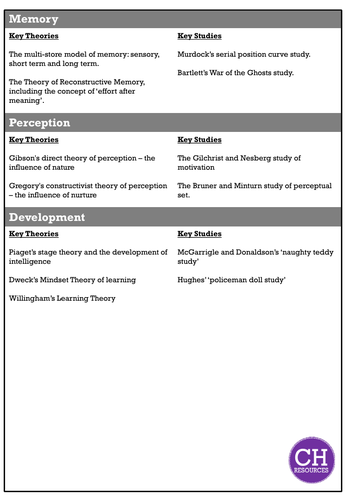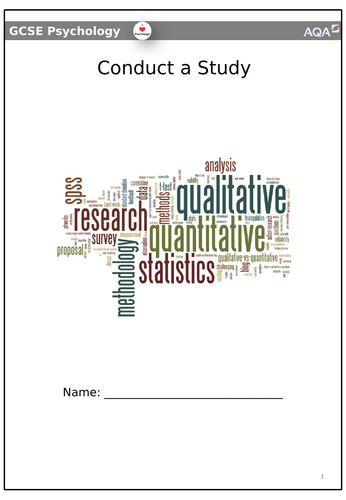
169Uploads
27k+Views
30k+Downloads
Psychology

AQA GCSE Psychology: Visual Illusions. (Lesson 3 of Perception)
This is a PowerPoint for the AQA GCSE Psychology Perception topic. These lessons are designed for roughly 60 minutes. All lessons contain a starter and plenary. Other lessons for this topic are in my shop or available as a bundle.
Starters included use a Starter booklet (https://www.tes.com/teaching-resource/aqa-gcse-psychology-perception-starter-booklet-12799826), this is available in the AQA GCSE Psychology Perception topic bundle, which includes all PowerPoints and all booklets.
I would recommend using this in conjunction with the AQA GCSE Psychology: Perception Workbook/Booklet in my shop (https://www.tes.com/teaching-resource/aqa-gcse-psychology-perception-workbook-booklet-12626166).

AQA GCSE Psychology: Gregory’s Constructivist Theory of Perception. (Lesson 5 of Perception)
This is a PowerPoint for the AQA GCSE Psychology Perception topic. These lessons are designed for roughly 60 minutes. All lessons contain a starter and plenary. Other lessons for this topic are in my shop or available as a bundle.
Starters included use a Starter booklet (https://www.tes.com/teaching-resource/aqa-gcse-psychology-perception-starter-booklet-12799826), this is available in the AQA GCSE Psychology Perception topic bundle, which includes all PowerPoints and all booklets.
I would recommend using this in conjunction with the AQA GCSE Psychology: Perception Workbook/Booklet in my shop (https://www.tes.com/teaching-resource/aqa-gcse-psychology-perception-workbook-booklet-12626166).

AQA GCSE Psychology: Perception Homework Workbook/Booklet
This editable 6 page workbook is perfect for homework, for experienced and new teachers alike.
Each page equates to one week’s homework with a different task on each page. The tasks are centred around revision and exam skills and keeps all homework in one place for easier organisation.
When printing, I would recommend converting the PowerPoint to PDF as this may cause some formatting issues with some printers.

AQA GCSE Psychology: Perception Starter Booklet
This booklet contains 9 starters than can be used at the beginning of each lesson in the AQA GCSE Psychology Perception topic, focussed on recall from the previous lesson. This works well in conjunction with my Perception Workbooklet and Perception PowerPoints.

WJEC Level 3 Criminology Unit 2 AC2.2 Individualistic Theories Lesson
This high quality PowerPoint covers all of the content required for AC2.2 Individualistic Theories of Criminality: Learning Theories, Psychodynamic Theories and Psychological Theories.
Throughout the PowerPoint, it tracks the progress throughout the Assessment Criteria, ticking off each theory to indicate how the students are progressing through the course.
Each theory has information on the slides, clearly explained for lower ability students and with extra information for higher ability students. It is very engaging, including embedded videos (link in the notes of the slide) and activities - with extension and challenge activities where appropriate. All tasks have answers included.

WJEC Level 3 Criminology Unit 2 AC3.2 Evaluate Individualistic Theories Lesson
This high quality PowerPoint covers the content required for AC3.2 Evaluation of Individualistic Theories of Criminality: Learning Theories, Psychodynamic Theories and Psychological Theories.
Throughout the PowerPoint, it tracks the progress throughout the Assessment Criteria, ticking off each theory to indicate how the students are progressing through the course.
Each theory has information on the slides, clearly explained for lower ability students and with extra information for higher ability students. All tasks have answers included.

WJEC Level 3 Criminology Unit 2 Revision Sheet
Unit 2 Knowledge Sheet, with each Learning Objective per A3 page.
The layout is very engaging for students and follows the specification. This can be used by providing it to each student to fill in or as a group activity in class.

Metacognition Revision Session
This is a quick (around 30 minute) session that can be delivered to exam classes on how to use metacognition skills to improve their revision. It comes with a handout with the activities on it plus the information from the slides to reduce their cognitive load and ensure they can pay attention to the presentation rather than hurridly making notes.

AQA GCSE Psychology Summer Revision Booklet
This is a 9 page, editable booklet to provide to Year 10 students over the summer holiday to aid their revision in preparation for Year 11. It covers Paper 1 content, a week to be spent on each topic (4 weeks in total), with around 8-10 questions covering each topic. There is ample space in the booklet to write the answers making it easy to check completion when they return in September.

AQA GCSE Psychology: Language, Thought & Communication Homework Workbook/Booklet
This editable 6 page workbook is perfect for homework, for experienced and new teachers alike.
Each page equates to one week’s homework with a different task on each page. The tasks are centred around exam skills and keeps all homework in one place for easier organisation.
When printing, I would recommend converting the PowerPoint to PDF as this may cause some formatting issues with some printers.

AQA GCSE Psychology Topics Requiring Evaluation
This is a PDF document outlining which theories and studies require evaluation under the AQA GCSE Psychology specification.

AQA GCSE Psychology: Hypotheses for Key Studies
This is a lesson resource to help prepare students for exam questions that require them to write a hypothesis for key studies across the specification. The lesson is scaffolded and guided to help students to do this successfully by the end of the lesson. It also serves as useful revision of all key studies. The

AQA GCSE Psychology: Research Method Evaluation Revision
A common exam question is to evaluate a research method. This could be as a simple question, such as “Evaluate the use of [x] in psychological research” or it could be as part of an essay on a key study, to describe that key study and then evaluate the research method of it. This lesson resource revises evaluation points for these research methods in breadth and depth to help students achieve well on these exam questions. It comes with a PowerPoint and handout for students to make notes.

AQA GCSE Psychology: Booklet of Possible Essay Questions
This is a booklet to allow students to practice possible essays on all key theories and key studies across the specification. It does not include synoptic essays or essays with AO2.

AQA GCSE Psychology: Evaluating the Research Methods of Key Studies
A common exam question is to evaluate a research method of a key study, this will be part of an essay. This resource prepares students for these questions by asking them to identify the research method of all key studies and then evaluating those, a handout is provided. All methodology have been checked against the AQA Scheme of Work where possible and will be updated. Evaluation wording has been taken from past mark schemes where possible.

AQA GCSE Psychology: Conduct a Study Booklet
This AQA GCSE Psychology: Conduct a Study Booklet outlines instructions for students to plan and conduct a simply experiment into the capacity of short-term memory. It has a checklist of what they need to plan out and instructions on how to deliver their experiment. On the final page is guidance on how to write a report about their study, this checklist covers as many things from the specification as possible and includes a challenge activity.
Bundle

AQA GCSE Psychology: Memory Topic Bundle
This contains all 11 lessons in the Memory topic for AQA GCSE Psychology. It also contains a Homework booklet, a Starter booklet and the entire Memory Workbooklet.
Processes of memory: encoding (input) storage and retrieval (output)
Different types of memory: episodic memory, semantic memory and procedural memory.
How memories are encoded and stored.
Structures of memory
The multi-store model of memory: sensory, short term and long term.
Features of each store: coding, capacity, duration.
Primacy and recency effects in recall: the effects of serial position.
Murdock’s serial position curve study.
Memory as an active process
The Theory of Reconstructive Memory, including the concept of ‘effort after meaning’.
Bartlett’s War of the Ghosts study.
Factors affecting the accuracy of memory, including interference, context and false memories.

AQA GCSE Psychology: Perception Workbook/Booklet
This editable 22 page workbook is perfect for independent study or guiding students throughout the lesson, for experienced and new teachers alike.
On Page 2 is the specification, with three faces so they can RAG rate their understanding throughout the topic. It also has a column they can tick to indicate that they have revised each area. On Pages 3-4 is a glossary which could be used as revision or in lesson as a key terms test.
On each page there is space for students to complete information or activities to demonstrate their understanding and completion of the topic.
When printing, I would recommend converting the PowerPoint to PDF as this may cause some formatting issues with some printers.

AQA GCSE Psychology: Brain and Neuropsychology Workbook/Booklet
This editable 23 page workbook is perfect for independent study or guiding students throughout the lesson, for experienced and new teachers alike.
On Page 2 is the specification, with three faces so they can RAG rate their understanding throughout the topic. It also has a column they can tick to indicate that they have revised each area. On Pages 3-4 is a glossary which could be used as revision or in lesson as a key terms test.
On each page there is space for students to complete information or activities to demonstrate their understanding and completion of the topic.
When printing, I would recommend converting the PowerPoint to PDF as this may cause some formatting issues with some printers.

AQA GCSE Psychology: Psychological Problems Workbook/Booklet
This editable 31 page workbook is perfect for independent study or guiding students throughout the lesson, for experienced and new teachers alike.
On Page 2 and 3 is the specification, with three faces so they can RAG rate their understanding throughout the topic. It also has a column they can tick to indicate that they have revised each area. On Pages 4-5 is a glossary which could be used as revision or in lesson as a key terms test.
On each page there is space for students to complete information or activities to demonstrate their understanding and completion of the topic.
When printing, I would recommend converting the PowerPoint to PDF as this may cause some formatting issues with some printers.




















